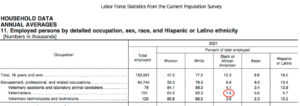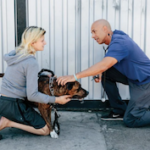Have you ever met an African American veterinarian?
Two remarkable veterinarians who changed the landscapes of their practice and made a significant difference in the well-being of the animals and the pet parents that they care for, are highlighted this month. Changing the basic format of a practice and becoming a mobile vet offers both advantages and disadvantages, these two vets found that the rewards outweigh the limitations.
This blog did a profile at the beginning of this month entitled “I’m Dr Stewart, Street Vet.” [Link] Dr S ‘moonlighted’ from his daytime job in a group practice to walk the streets of Los Angeles and care for the pets of the ‘unhoused,’ who were living on the street in makeshift dwellings. Wearing scrubs and carrying his medical bag, he convinced these ’street people’ to allow him to examine their pets and he offered shots, vitamins, and simple remedies and treatments. Initially, like many others, he questioned why homeless people had animals to begin with—if humans couldn’t take care of themselves, how could they be responsible for pets? And yet they were. In fact, numerous academic studies over the years have revealed the vital role pets play in the lives of unhoused men and women—providing structure, purpose, meaning and love.
According to Dr Stewart, “Pets were a lifeline to the people I met,” he says. “Most of them were great pet owners. They did remarkably well with the resources they had, and made sacrifices for them well beyond what you or I would. The bond between them was on a completely different level. They needed each other.”
Deciding to become Vet
Dr Stewart recalls that as an African-American track star in high school, his coach asked him what his career plans were. When he replied a veterinarian, his coach was dumbstruck and said “I’ve never seen a black vet.” Decades later the number of African American veterinarians is still so small that the US Bureau of Labor Statistics has reported that it might as well be considered zero.
Dr S has now set up a mobile team in SanDiego and founded Project StreetVet, raising money on GoFundMe to cover the cost of treating pet medical problems beyond the scope of a sidewalk exam.
The second vet that we spotlight is Dr. Marcy McKeithen. She is Detroit veterinarian who shifted her business model to help more pets. She founded Motor City Vet Care and meets clients where they’re comfortable – at home.
As a veterinarian in Detroit, she found a way to make things easier — she ditched the brick-and-mortar model and took her business on the road. “This has been a dream, a dream that I’ve had for probably 10 years,” Dr. McKeithen said. Well before the COVID pandemic, Dr McK had the idea to do door-to-door vet care. “I know there’s lots of pets that are super anxious about going to the vet. They don’t like the car ride. They don’t like the smells,” she said.
had for probably 10 years,” Dr. McKeithen said. Well before the COVID pandemic, Dr McK had the idea to do door-to-door vet care. “I know there’s lots of pets that are super anxious about going to the vet. They don’t like the car ride. They don’t like the smells,” she said.
Just more than a year ago, McKeithen launched her door-to-door vet care business. It quickly gained attention of many pet owners in need of care, especially from those who adopted animals in the pandemic. “My house call practice is not meant to replace the relationship with a brick and mortar facility, but it’s definitely meant to supplement some of the practices that are just kind of over their limit.”
On becoming a Vet
Dr. McKeithen grew up in Detroit and attended college and Veterinarian school in Florida. She experienced culture shock at veterinary school being the only black student. “On the very third day of vet school, I had to make a choice,” said McKeithen, “Was I going to be the person that was constantly offended, withdrawn and not make friends with anyone because I felt like I didn’t connect with anyone? Or was I going to use this as a teachable moment?”
She typically brings up this topic when she finds herself as the only Black veterinarian in the room. She points out, “I think that it needs to be brought to attention that this is a very, very, very homogeneous field and we (people of color) need more representation.”
In her new mobile practice she offers apprenticeships to youth in Detroit high schools and colleges to have an opportunity to ‘learn the business’ and the science of caring for pets with the hope of inspiring future veterinarians.
Dr McK has an interesting podcast interview geared toward other vets who are considering “going mobile” at The House Call Vet Cafe. Give it a listen.
Here is the US Bureau of Labor Statistics most recent data on veterinarians, assistants, and technicians.

This is a sad professional statistic for Black History Month. These two pioneers can hopefully offer inspiration to others who may never have considered taking their devotion for pets to the next level. Perhaps it can also inspire potential funding sources to offer scholarships, grant awards, corporate challenges and other incentives to help solve our veterinary shortage in this post-pandemic era.



